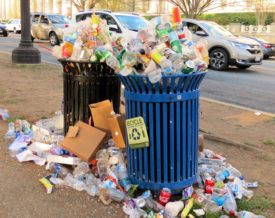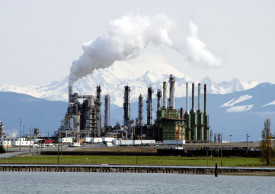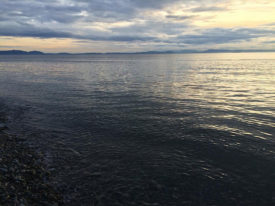Washington’s leaders have been making a lot of noise about cleaning up Puget Sound. Governor Gregoire wants to boost Sound restoration dollars by $42 million, or about 50 percent. It’s earning the governor heaps of glowingmediaattention.
But the media has turned a blind eye to the astronomical number of cruise ships poised to foul local waters. A single line, Holland America, just announced that it will be increasing its cruises out of Seattle from 37 to 61. In 2006, according to the Port of Seattle, 200 cruise ships with enter and depart Puget Sound (roughly a 30 percent increase from 2005) and they’ll ferry an estimated 735,000 people. Those cruise ships are potential ecological catastrophes, especially when their dumping practices are not actually, uh, regulated, as they are in California and Alaska.
What damage can a cruise ship do? According to WashPIRG:
In a day, a typical cruise ship of 3,000 passengers and crew produces 30,000 gallons of sewage, 270,000 gallons of other wastewater, and additional gallons of hazardous wastes, biomedical waste, oily bilge water, and solid waste.
You do the math. What I mean is: multiply each of those numbers by 200, then multiply again by the number of days each ship is in the Sound, and you’ll find the potential environmental impact of just one year of the cruise industry. And the threat to Puget Sound is not just hypothetical. A Norwegian cruise line dumped 40 tons of human waste near Whidbey Island a couple of years ago. Oops.
At present, the cruise industry in Washington is governed with the lightest of hands—unenforceable memorandums of understanding, rather than genuine legislation. What’s the solution? Real legislation to prevent dumping with real enforcement mechanisms. Levying a per-head remediation fee in advance of another "mistake" wouldn’t be a bad idea either.
Adding to the list of insults, the cruise ships mostly burn low-grade dirty diesel—despite promises to the contrary—and it may be fouling the air in downtown Seattle with carcinogens. I’d welcome additional legislation regulating cruise ship emissions too.
Unfortunately there’s scant reason to believe Washington will get real enforcement because the issue has been largely overlooked by the media (and hence it’s invisible to most citizens). Perhaps too busy heaping praise on the Puget Sound clean-up proposals, Seattle’s media outlets have pretty much ignored the cruise ship catastrophe. I could find only one mention of the Port’s announcement to dramatically increase cruises in 2006—and that was buried in a boosterish article in the P-I‘s business section—and no mention of the additive environmental effects. Have I missed something? Or is it just being ignored?
(Hat tip to Dan over at the Seattlest blog, who’s been throwing haymakers at the cruise industry lately. See here and here.)







